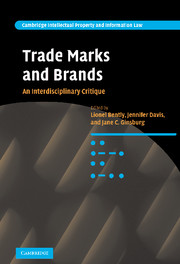Book contents
- Frontmatter
- Contents
- List of figures and tables
- Notes on the contributors
- Editors' preface
- Table of cases
- Table of statutes
- Part I Legal and economic history
- Part II Current positive law in the EU and the USA
- Part III Linguistics
- 5 ‘How can I tell the trade mark on a piece of gingerbread from all the other marks on it?’ Naming and meaning in verbal trade mark signs
- 6 What linguistics can do for trademark law
- Part IV Marketing
- Part V Sociology
- Part VI Law and Economics
- Part VII Philosophy
- Part VIII Anthropology
- Part IX Geography
- Bibliography
- Index
- Titles in the series
6 - What linguistics can do for trademark law
Published online by Cambridge University Press: 13 April 2010
- Frontmatter
- Contents
- List of figures and tables
- Notes on the contributors
- Editors' preface
- Table of cases
- Table of statutes
- Part I Legal and economic history
- Part II Current positive law in the EU and the USA
- Part III Linguistics
- 5 ‘How can I tell the trade mark on a piece of gingerbread from all the other marks on it?’ Naming and meaning in verbal trade mark signs
- 6 What linguistics can do for trademark law
- Part IV Marketing
- Part V Sociology
- Part VI Law and Economics
- Part VII Philosophy
- Part VIII Anthropology
- Part IX Geography
- Bibliography
- Index
- Titles in the series
Summary
Introduction
In his contribution to this volume, Alan Durant provides legal scholars with both a rich understanding of how linguists view terms that are part of the basic argot of trademark law and a potentially vital explanation of the different social functions that word marks might serve. Both aspects of his analysis introduce the complex variable of reality into trademark law. Trademark law must decide whether and when to take account of that complex reality, and what weight to afford such reality, no matter how enriched an account linguists offer about the actual meaning of signs. In this response, I suggest that, while trademark law should not become beholden to linguistics, the lessons of Durant's linguistic analysis are to some extent already accommodated in the practice of trademark law, and could be important guides in the further development of a number of legal principles.
Section 1 of this chapter explains why linguistics should matter to trademark law. Traditionally, and still most typically, words comprise the largest group of trademark subject matter. Trademark law is structured around protecting the meanings of those words, at least as understood by consumers, in order (classically) to prevent consumer confusion. I suggest some reasons why trademark law might ignore the precise reality of consumer understanding. However, the starting point (if not always the end point) of trademark law in many contexts is an understanding of how signs actually work in context, and linguistics is one way of establishing that starting point for words.
- Type
- Chapter
- Information
- Trade Marks and BrandsAn Interdisciplinary Critique, pp. 140 - 158Publisher: Cambridge University PressPrint publication year: 2008
- 3
- Cited by

